Jesus, Scripture, Israel & Palestine
Hi Dojo readers,
Last night at my Alma Mater, Gordon-Conwell Charlotte, I had the honor of entering into public dialogue with my good friend Dr. Michael Brown on the subject of Jesus, Scripture, Israel & Palestine. GCTS’ Dean, Dr. Tim Laniak, moderated the event and around 200 people showed up. It was an excellent discussion…and my only regret was that we didn’t have nearly enough time to unpack all the issues which factor in to how people view the subjects of Biblical-vs.-modern-Israel, eschatology, and most importantly, the current Israeli-Palestinian conflict.
The dialogue unfolded within three overarching categories: Ecclesiology (Who is “Israel”?), Eschatology (What is God’s plan for “Israel”) and Ethics (should Christians stand with the modern state of Israel?).
Dr. Brown and I each gave opening 15 min introductions (in which neither of us had time to share as much as we’d have liked, obviously, given the gravity and complexity of the issue). This was followed by guided discussion by Dr. Laniak and some back-and-forth between the two of us.

For those that were not there, HERE is my Powerpoint presentation (including all the quotes, facts and photos I didn’t have time to share). Below are some of the points I would like to have covered, if we’d had time:
On the subject of who “Israel” is in Romans 11…
It all comes down to how we translate a single preposition!
“The only question is whether he sees this as the adding of the unbelieving majority to the believing minority of Jews, which then amounts to “all Israel.” Or is he talking about adding the unbelieving majority of Jews to the whole people of God and so the whole people are brought up to “fullness,” both Jew and Gentile united in Christ.” [Ben Witherington, Paul’s Letter to the Romans: A Socio-Rhetorical Commentary]
“To repeat: Paul is not saying that all those presently ‘hardened’ are bound to remain in that condition. On the contrary. That is the position he fears the gentile Christians in Rome may adopt, and he is arguing against it, all the way from 11.11 to 11.32. Indeed, it is partly in order to argue against that position that he has constructed this seriously dense and densely serious section of the letter. Presently hardened Jews can at any time, he insists, be ‘made jealous’, and can thereby be brought to Messiah-faith and so to salvation. But we must not, in our eagerness to agree with him on this subject, overaccept the point and over-exegete the passage. The ‘until’ clause (‘ until the fullness of the nations comes in’) does indeed provide a temporal marker, but it is not a marker which of itself can tell us what happens to the ‘hardened’ part of Israel once that time is reached. The majority view among recent exegetes has been to read the ‘until’ as indicating the time after which the ‘hardening’ will be lifted, and all ‘the rest’, suddenly unhardened, will be saved (with or without faith). But Paul does not say this, and we must not without warrant lurch after such an understanding. …the use of the time thus created for the fullness of the gentiles to come in – is the means by which God is saving ‘all Israel’. The distinction between reading houtōs as an indication of time and an indication of manner effects a serious shift. If we read it as temporal, it opens up a forward perspective in the text: ‘and then, something new will happen, namely the salvation of “all Israel”, as scripture says …’.
But if we read it as an indication of manner, it looks back: ‘and that, the entire sequence of 11.11– 24, summed up in 11.25, is how “all Israel” will be saved’. But this brings us to the all-important phrase itself. Clearly Paul has not settled on a single designation for the Messiah-people. But, equally clearly, he constantly refers to that people in ways which indicate what his explicit argument in Romans 2— 4, in 2 Corinthians 3, in Galatians as a whole and in Philippians 3 all make clear: that in Israel’s Messiah, Jesus, the one God has fulfilled the ancient Israelite hope, expressed by Torah, prophets and Psalms alike, by bringing the nations of the earth to belong to Abraham’s people. Paul is acutely aware of the many painful paradoxes that go with this belief, but he will not draw back from it.
…“For Paul, ‘Israel’ will be a complete entity only when ‘the fullness of the gentiles’ comes in and ‘the Redeemer’ comes from Zion to take away ‘Jacob’s’ sins.” [Wright, N. T. (2013-11-01). Paul and the Faithfulness of God: Two Book Set (Christian Origins and the Question of God) (Kindle Locations 33762-33766). Fortress Press. Kindle Edition.]
On the prophets envisioning a future in which Gentiles would be included within Israel…
“The OT is our story. Joshua is not simply my hero. He is my forefather. The Patriarchs are our ancestors. Israel’s victory in the OT is our victory as a community of faith today… I am not saying that the church has replaced Israel. Instead, I believe that we joined Israel. We became part of Israel. I believe that Jesus is the true Israelite… and since we are in Christ today, then we are and have always been in Israel. At a certain time in history, we were not part of God’s household… But the implications of Ephesians 2 and Romans 11 are that now we are God’s household, and since we are God’s household…we claim the history of salvation that started in the OT and found its culmination in the death and resurrection event as our history. We share in the nourishing root of the olive tree…[The State of] Modern Israel not only robbed us of our land and freedom, but it also robbed us of our Scripture and spiritual heritage as Palestinian Christians.” [Dr. Munther Isaac, in “The Land Cries Out: Theology of the Land in the Israeli-Palestinian Context]
On the role that trauma and victimhood play in forming selective narratives through which people view the conflict…
When two narratives of the same events are diametrically opposed…
There’s likely some truth in BOTH of them. Our job is to listen to the other side and sift out the true from the false, while avoiding whitewashing our own.
The Palestinian narrative is one in which a European colonial empire has robbed them of the vast majority of their land…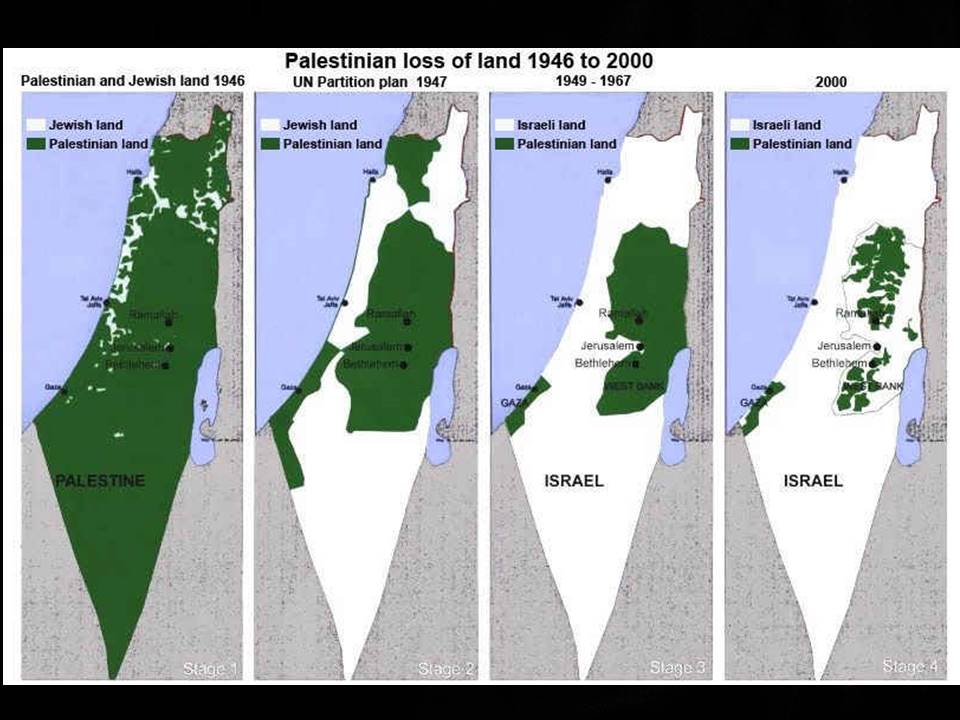
But the nationalist Zionist narrative says, “Look at how much land WE’VE given up for peace!”…
Rhetoric of denial is usually used to justify the actions of a group. In this case, the violent highly-nationalistic settlers in Hebron (where I took this photograph on Shuhada Street–also known as “Apartheid Street” because it is illegal for Arabs to walk on it) have launched a public relations campaign to delegitimize the Palestinian narrative entirely…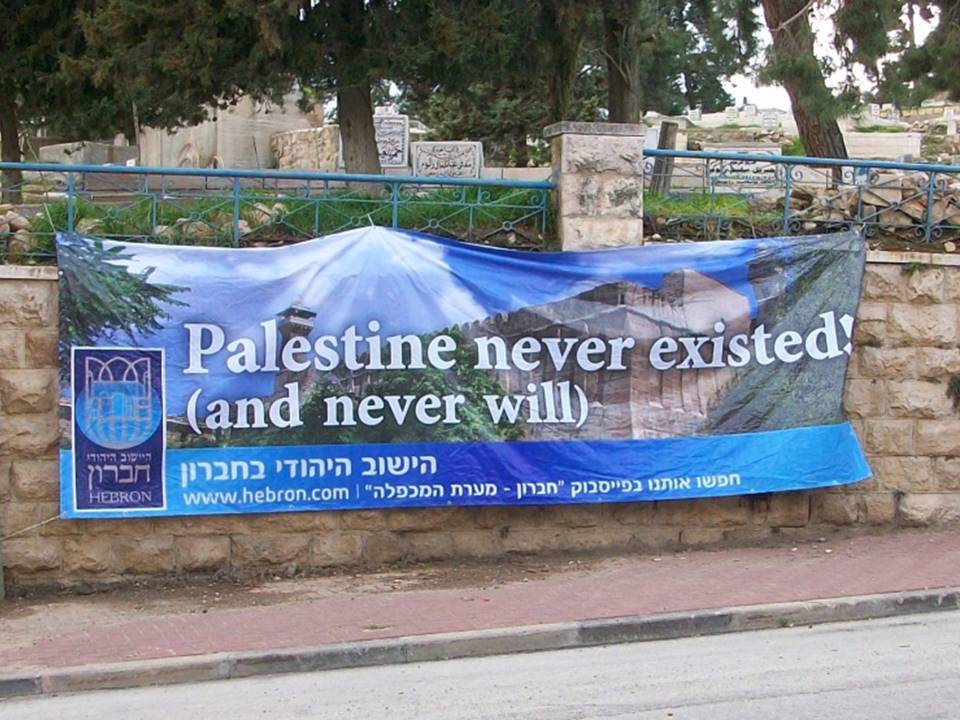
On two sides of the same street in Hebron, in fact, one can see the competing narratives in the form of graffiti…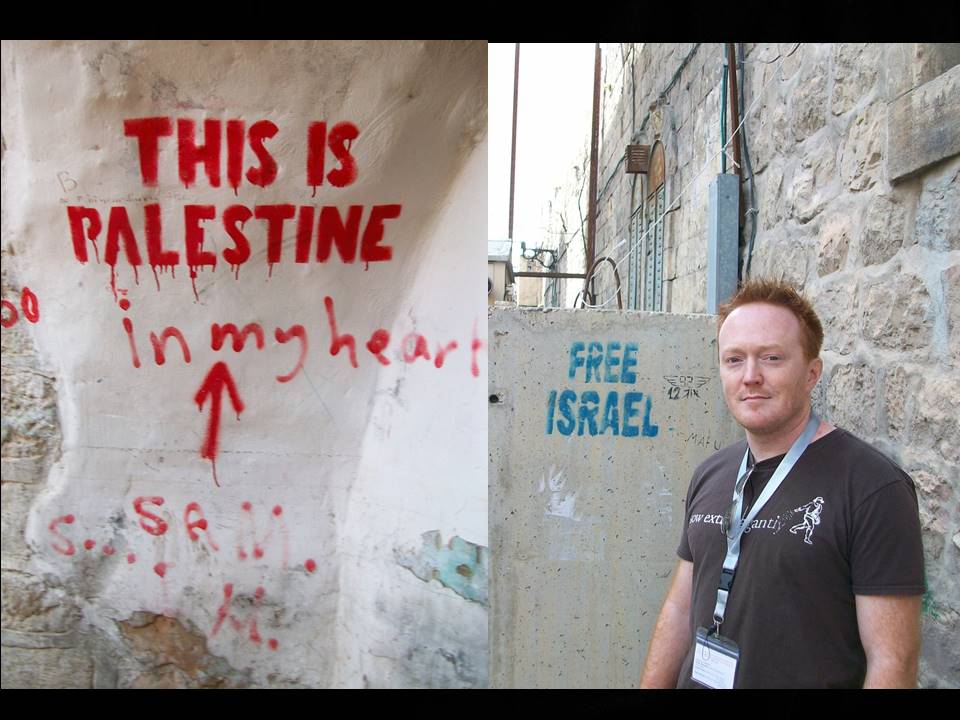
From the beginning, nationalistic Zionists used rhetoric of denial in order to justify their presence in Palestine and their appropriation of its resources…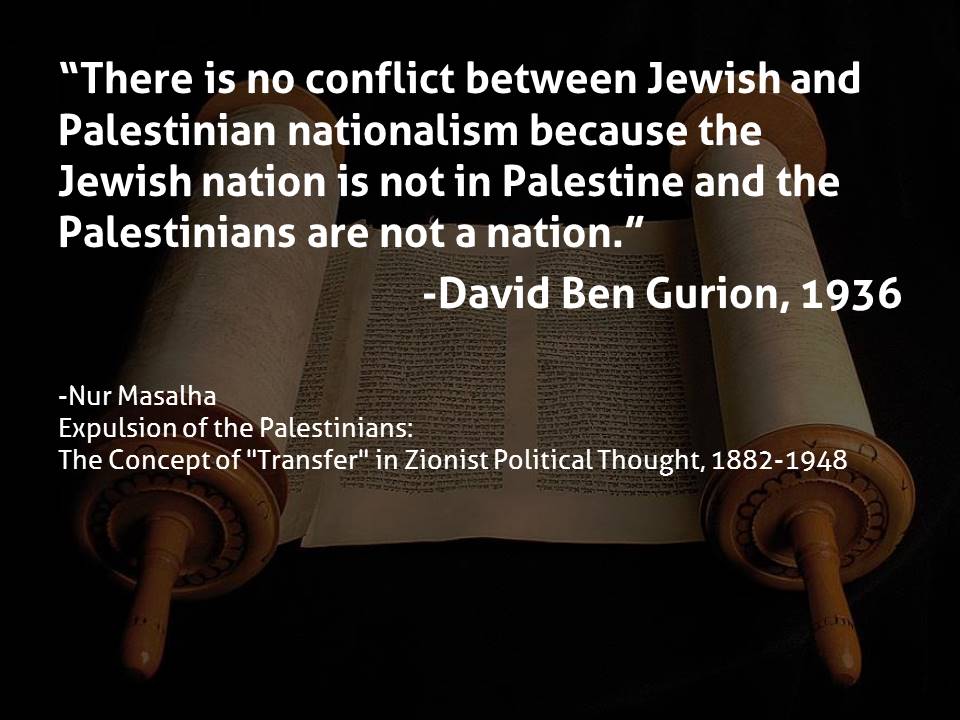
Israeli Zionists were not the only ones who employed such rhetoric to justify their actions…
“I do not admit that the dog in the manger has the final right to the manger, even though he may have lain there for a very long time. I do not admit that right. I do not admit, for instance, that a great wrong has been done to the Red Indians of America, or the black people of Australia. I do not admit that a wrong has been done to those people by the fact that a stronger race, a higher grade race, or, at any rate, a more worldly-wise race, to put it that way, has come in and taken their place.” [Winston Churchill, 1937. cited by Ben White in “Palestinians in Israel: Segregation, Discrimination and Democracy”]
On the role that trauma and victimhood continue to play within Israeli society…
To this day, many (though certainly not all!) Israeli Jews are raised to see Israel as this tiny little country surrounded by a world bent on its destruction…for no other reason than that they are Jewish. Dr. Avigail Abarbanel, an Israeli-born Jewish psychotherapist shares her story…
From a very young age, about 6 or 7 years old my generation was exposed to gruesome images of the Holocaust, piles of dead emaciated bodies, the mountains of shoes, the gates of Auschwitz, hungry and filthy children and adult prisoners in stripy pyjamas peering desperately through barbed wire. We were taught Holocaust stories, real and fictional, about the life of children like us in the Ghettos under the Nazis: the ever present hunger, the crowded conditions, the daily struggle to survive, the uncertainty, heroic children risking their lives to smuggle food into the ghettos, and the constant terror of cold-hearted SS soldiers, their guns and their dogs.
The messages were crystal clear: ‘This could be you because you are Jewish. The only reason it isn’t, is not because they won’t try to do it to you — they almost certainly will do this again — but because you are here in Israel. The Holocaust victims were weak Jews but you are an Israeli, and you must grow up to be strong. Israel is the only protection you have against ending up like one of these children in the stories and the photos. You must help make Israel strong and do everything you can to make sure it survives, so that you don’t end up like these Holocaust children’.
…When people are indoctrinated this way, this is not designed to elicit intellectual discussion. This is meant to penetrate deep into your unconscious, to the level below awareness and intellectual engagement. That way it forms a part of the very fabric that makes you who you are, it shapes you into something that the state can use. It goes so deep that it’s the sort of thing that few people tend to question.
There were plenty of school excursions deliberately designed to instil in us a deep sense of connection to and ownership of the land. Difficult issues were either lied about outright or cleverly avoided. For instance, each time we visited a site of a destroyed Arab town or village from 1948, the reason given for what we saw was that the Arabs chose to flee. (I am using the word ‘Arab’ because this is the word that was always used. The word ‘Palestinian’ was never mentioned back then. It started to penetrate the daily vocabulary much later.) The emphasis was always on how we made the desert bloom and how there wasn’t much there before our brave pioneers came and settled the land. Until a few years ago I didn’t know that we committed deliberate and systematic ethnic cleansing in 1948; that we drove out the Palestinian population and caused over 700,000 people to become refugees; that we refused their return despite a clear UN resolution from 1949. None of this is mentioned in Israeli history classes, and the majority of people still believe what they were taught at school. It’s easy to support the false knowledge that the state teaches. What’s the alternative?
All the while when we were being brainwashed to be good loyal Israelis, terrible things were being done right under our noses. Some we didn’t see, some we heard about but dismissed and others we interpreted from within the official paradigm.
Life in Israel feels so intense and so anxious that few people have any energy left to take real interest in what’s going on. And if what’s going on contradicts the way Israeli-Jews have been conditioned to see themselves, then it’s all the more urgent to push all this out of awareness.
My brother, his wife and I have a good personal relationship but we never talk about politics. He belongs to this class of Israeli-Jews who try to not see or hear what’s going on. If my brother is pushed, he would usually express the standard apologist nonsense we have all been fed, such as that the Palestinians are not like us, that they don’t really want peace and that there is no one to talk to on the other side. These arguments show a profound ignorance about what’s going on and they are nothing more than a repetition of the official state position. But I think remaining ignorant is a conscious choice.
It’s effortless to access the information the government wants you to know in Israel but if you want to find out what’s really going on or read other perspectives, you have to make a conscious effort. Few people are prepared to do this. The members of the Israeli human rights and peace groups are doing that but they are a very small minority.
The turning point for me came when I began to learn about the true reality of the conflict between Israeli-Jews and the Palestinians — that was a result of hearing Avi Shlaim, the author of The Iron Wall speak on ABC radio in 2001. What he said was deeply disturbing to me. I think if he wasn’t an Israeli-Jew himself, I would have dismissed it all as anti-Semitic nonsense. But I couldn’t easily dismiss a professor of history at a respected British university who just like me was also a former Jewish citizen of Israel. From that point on, a rift began to open between my personal human values and my Jewish-Israeli loyalty. The more I learned about the true history of Zionism and Israel the more I questioned everything I used to believe. It became harder and harder to continue to be loyal to Israel and to Jewish-Israeli culture and to continue to be an apologist for Israel.
Every aspect of my education and upbringing in Israel was designed to make me a loyal Israeli Jew. A loyal Israeli Jew is someone who puts his or her differences with local politics aside if the nation is under threat. There is a perception in the world that Jewish-Israelis are allowed to express their opinions freely and without fear of retribution from the government. This is true only up to a point. I think George W. Bush’s statement after 9/11 ‘You’re either with us or with the terrorists’, sums up well the nature of patriotic loyalty in Israel.
The problem is that the way the culture is promoted and celebrated; the existential threat is never far off. It’s reinforced almost with every religious festival and in popular culture. When I was growing up it was a regular occurrence for the Chief of Staff to reassure us that ‘Israel is ready for the next war’. The word ‘war’ was always there and we truly believed that we were surrounded by terrible and powerful enemies who want to throw us into the sea.
This some of what the majority of Jewish Israelis believe:
- We are Jews and therefore everyone hates us; everyone hates us because we are Jews.
- This hatred cannot be changed. Hatred of Jews is in the blood of every gentile (a derogatory term for non-Jews) and is passed on genetically. It’s like a mental illness that can’t go away.
- Even those who don’t exactly hate us were not prepared to stick up for us when we were in trouble, therefore non-Jews can never be trusted. There are ‘good gentiles’ and ‘bad gentiles’ but we can’t really trust even the good ones.
- This is our fate from the beginning of our existence. The Jewish people have been despised and persecuted from their beginnings. There is a continuous history leading up from biblical times to the present day. It’s never changed. Hitler and Pharaoh of the Exodus story are the same.
- The Holocaust is the ultimate proof that Jews cannot be safe among non-Jews.
- Israel is the only safe haven for Jews and must remain under Jewish sovereignty. It must always guarantee special rights for Jews, like the right of return, so that no Jew anywhere will ever find him or herself in the same situation as the Jews who were victims of pogroms and of the Holocaust.
- This must never happen to us again.
- It happened to us because we were weak therefore we must become very powerful and never let anyone push us around.
- We will never be safe until all foreigners and Arabs in particular are pushed away from our borders. We can only be safe among our own people.
- We have a right to hurt others because we have been hurt — the principle of ‘destructive entitlement’ (a term from family therapy) is at the heart of Jewish-Israeli culture.
- Others don’t matter as much as we do.
- Another Holocaust is imminent. Jews from around the world must have a place to run to when it happens. Israel needs to have enough land and resources to take in 12 million Jews.
- The main purpose of the life of every Jewish woman, man or child is to work to help the Jewish people survive. Therefore any other aspirations and passions must come second. Any values that Jewish people have must be put aside when the survival of the people is threatened.
- This makes the life of Jews and Israeli Jews more difficult than the life of other people. But this is just how it is. It is our lot to have a hard time and this goes all the way back to the Bible.
Belief in ‘specialness’ has always been part of Jewish culture… It can also be a reaction to trauma…Here are some of the beliefs held by Israeli-Jews:
- Jews and therefore Jewish Israelis are more special than other people.
- Jews have a special relationship with god.
- Jews are more ethical and moral than all other people. By extension Israel as a Jewish state is a more moral and noble country that other countries. It is ‘the only democracy in the Middle East’.
- Israeli wars are different to other people’s wars. Our wars are just and are all ‘wars of no-choice’ — milchamot ein breira.
- Our occupation is different to other occupations. We treat the Palestinians better than occupied people in other places. We cannot possibly be compared with other bad countries who do bad things.
- Our colonisation of Palestinian lands is different too. First, it’s our land anyway, and second, as Jews we didn’t have a choice. What did you want us to do — die in the Diaspora?
- Our suffering is greater and more special than the suffering of anyone else.
- Even the hatred of Jews is not like other types of racism. It’s different and special. The Holocaust is proof of that.
- The Holocaust is unlike any other genocide in human history.
- Criticism of Israel is not like criticism of other countries. It is anti-Semitism in modern disguise. By extension any Jew who criticises Israel is aiding and abetting not only the enemies of Israel but the enemies of the Jews in general, and are therefore traitors. To be a traitor you must be mentally defective in some way. Healthy people are loyal to their group no matter what.
- Our survival is more important than the survival of anyone else. We have more right to exist than they do.
- Our love for our children and our families is superior to that of others.
- Israel’s strategic enemies hate Israel because it is a Jewish state. Their hatred has nothing to do with anything Israel might have done.
- Opposition to Israel in the region has nothing to do with sympathy towards the Palestinians and everything to do with anti-Semitism. Arabs and Muslims in general hate Jews.
…It’s easy to see how a policy of apartheid is in fact embedded in the culture and comes directly from it. Jewish people believe that they should be separate from others because others are not safe. This belief makes a policy of apartheid seem reasonable and acceptable. Morality or human values are pushed aside when it comes to survival and I think this is a wider human problem that is not unique to Israel but it certainly plays a huge part in Jewish-Israeli culture. [Dr. Abarbanel’s full presentation can be found at: http://www.avigailabarbanel.me.uk/growing-up-blind.html]
On how such trauma narratives produce fear-based thinking and rhetoric…
Many nationalistic Zionists see Israel as surrounded by hordes of bloodthirsty Muslims/Arabs who are just waiting for an opportunity to destroy them. The nationalistic Zionist comic strip “Dry Bones” frequently makes use of fear-based, anti-Arab tropes in defense of the ongoing Occupation of Palestine…
[Arabs are] “beasts of the desert, not a legitimate people…The Arabs are not a nation but a mole that grew in the wilderness of the eternal desert. They are nothing but murderers.” -Avraham Stern, 1940
Likewise, the IDF produces such graphics to justify military retaliation against densely-packed civilian populations in Gaza by presenting Israel as a victim of nonstop missile attacks that no other country in the world would tolerate…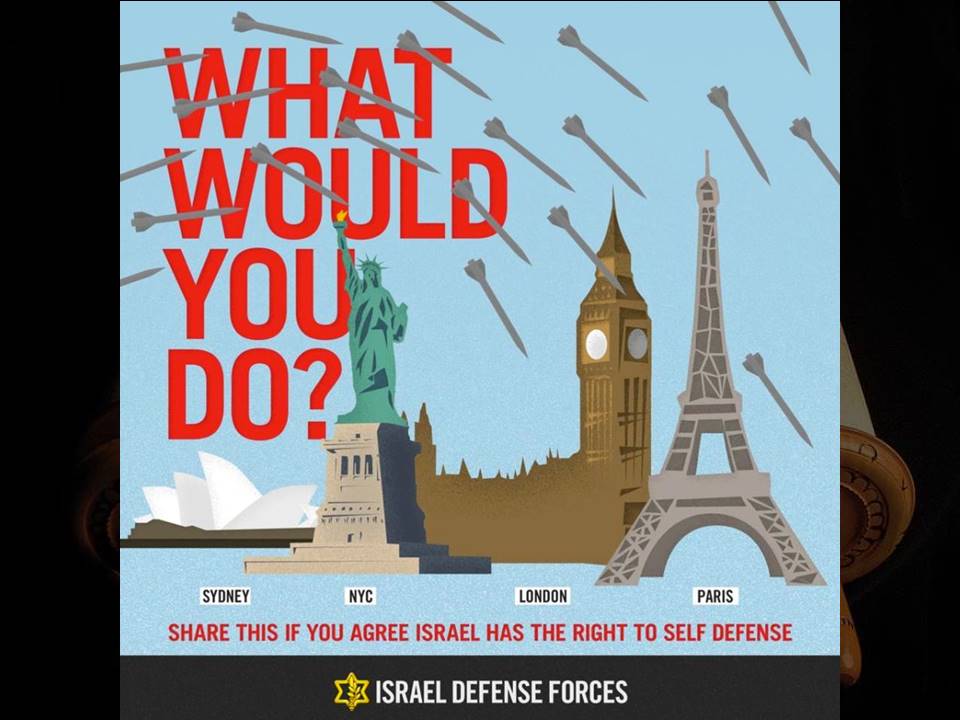
But those who oppose Israel’s heavy-handed responses see things differently of course…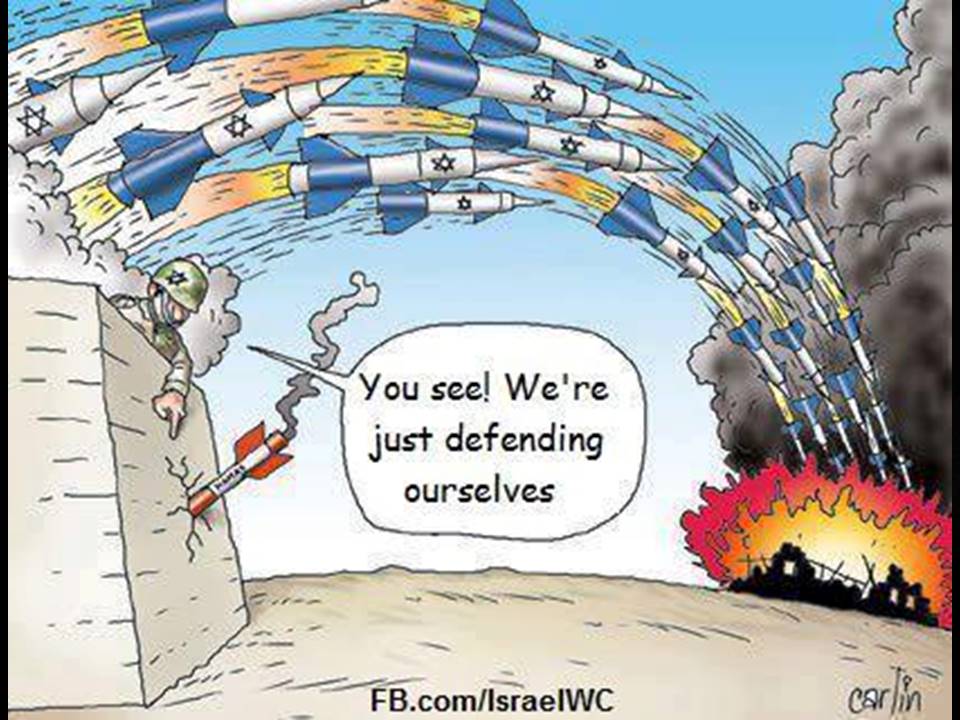
In fact, when you look at the actual death tolls over the past 15 years or so, things look different than many have been led to believe…
Depending on one’s narrative, the events of modern Israel’s founding have VERY different meanings…
On the population transfer plans of early nationalistic Zionists…
Some say that early Zionists wanted the Palestinian Arabs to remain and live alongside them in peace. However, despite public declarations from time to time expressing this idea, the actual founding Zionist figures maintained quite clearly that the goal was expulsion of the vast majority of the Arab population from Palestine in order to secure a majority Jewish state. This transfer of populations is what a number of Israeli Jewish historians refer to as “ethnic cleansing”…
Herzl on transfer…
Ussishkin on the priority Jewish immigration takes over removing indigenous Arab population…
Weitz on the need for Zionism to be clear that transfer is the goal, even if they must avoid such language in public discourse…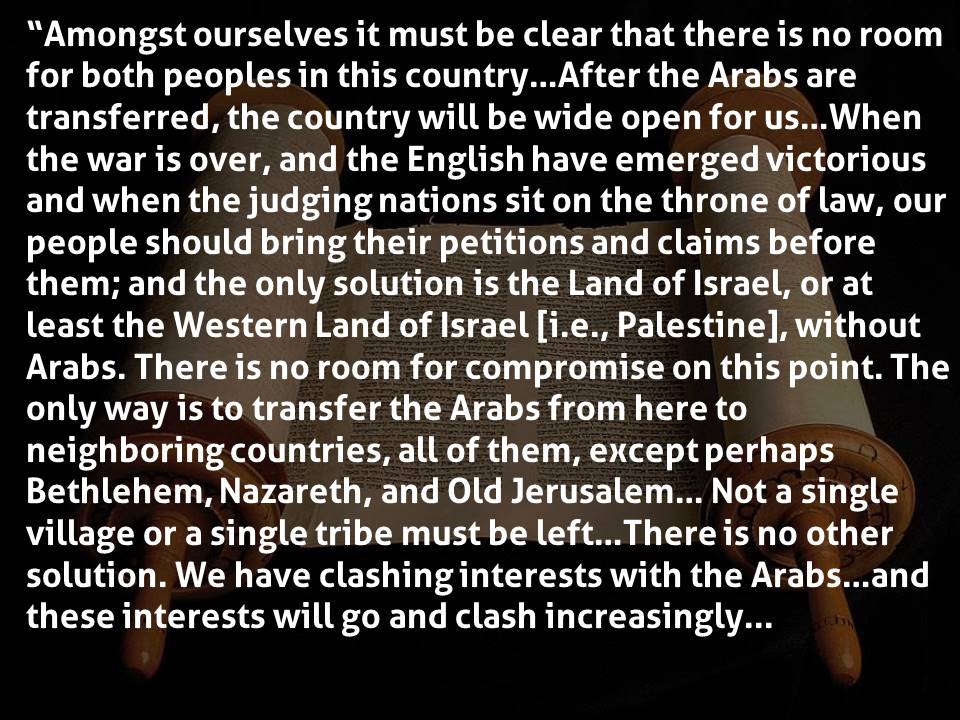
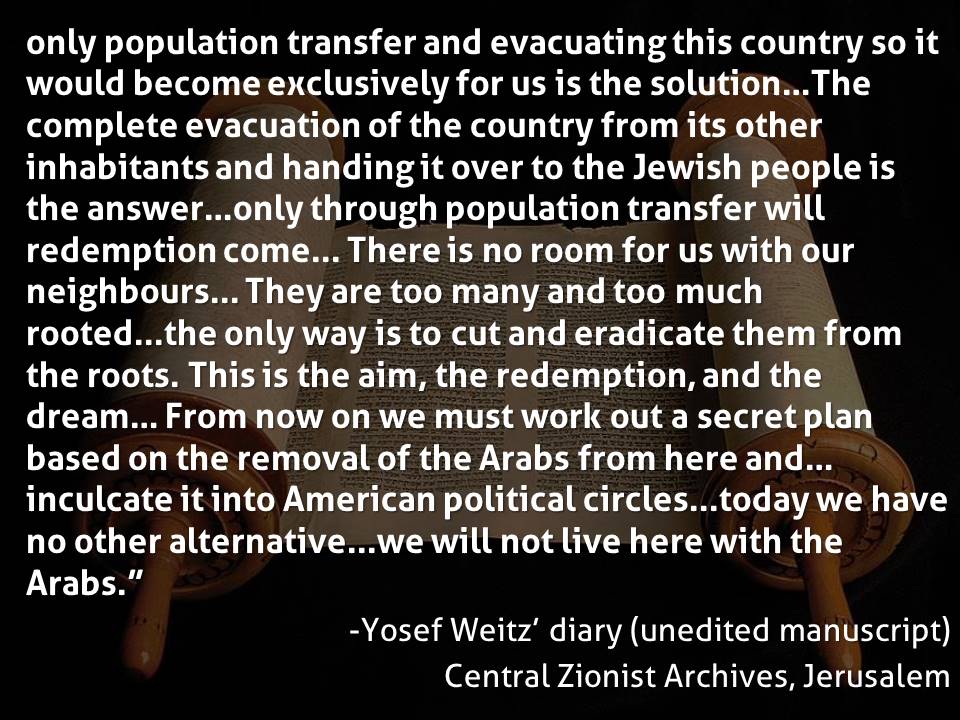
Ben Gurion (whom Dr. Brown quoted as pleading with Palestinian Arabs to stay in the land…but who held very different views in actuality)…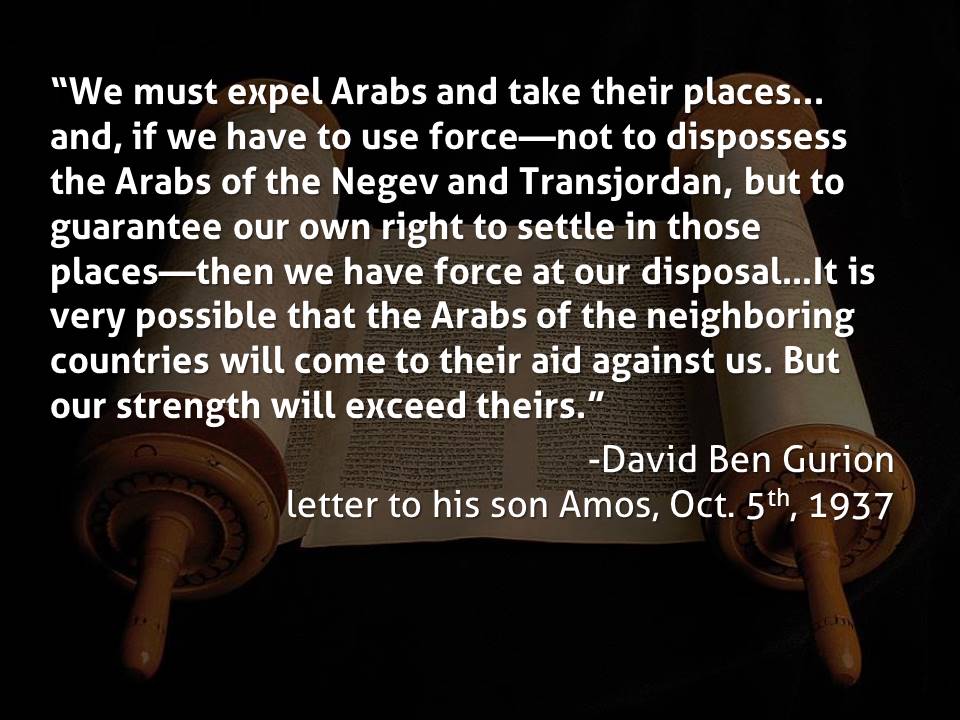
“…transfer of Arabs out of the country in my eyes is one of the most just, moral and correct things that can be done. I have thought this for many years.” [Shlomo Lavi]
[There is nothing] “more moral, from the viewpoint of universal human ethics, than the emptying of the Jewish state of the Arabs and their transfer elsewhere….This requires [the use of] force.” [Avraham Katznelson]
[All of the above quotes can be found in Nur Masalha’s book linked in the resources below]
On the idea that the majority of the Palestinians voluntarily left in order to wait for the Arab army’s victory before coming back to take over the land…
On early nationalistic Zionist atrocities…
Jabotinsky endorsed the terror campaign launched in the late 1930s by the Irgun, a campaign that involved such actions as placing bomb-loaded vegetable barrows in crowded Arab markets in Haifa and Jerusalem and firing indiscriminately on Arab civilian houses. Irgun’s bombing attacks of the late 1930s and 1948 were aimed at Palestinian civilians. Lehi specialized in political assassinations. Between the Haganah’s 20 May 1947 blowing up of an Arab cafe in Fajjah and the Stern Gang’s blowing up of the Cairo-Haifa passenger train (forty Arab civilians killed, sixty injured) in March 1948, more than 90 attacks on Arab villages or civilian targets took place. Most of these attacks did not involve an exchange of fire; they included such terrorist acts as burning cinemas, setting off explosives in market places, spraying bullets into crowds gathered at cafes or in the streets, dynamiting houses with people in them, and so on. [Nur Masalha, Expulsion of the Palestinians: The Concept of “Transfer” in Zionist Political Thought, 1882-1948]
“…the Kafr Qasim massacre in 1956 when close to 50 villagers were murdered by soldiers enforcing a curfew. The Eight soldiers who received jail terms had their sentences commuted, and were all out 4 years later. The commanding officer was fined an agora, ‘Israel’s smallest coin’.” [Ben White, Palestinians in Israel. p.81]
On why the Arabs rejected the Partition Plan in 1948…
Author Craig Nielsen gives a helpful analogy to understand much of what lay at the root of the Israeli-Palestinian conflict:
In my hometown of Adelaide, South Australia there has been an influx of Sudanese migrants since that country plunged into conflict some years ago. This has caused some problems of readjustment with the locals here in Australia and I myself have heard some very racist reactions to these new Australians. However, I do believe in the long run that these people will be accepted just like the Asian community was during the 80s and 90s. Australians may be wary of newcomers who are markedly different from Europeans but in the end I feel the necessary changes to attitudes will be made.
But let us imagine for a while what the situation would be if instead of this migration by Sudanese people looking to become Australians we replaced it with Sudanese coming to Australia in order to create an independent Sudanese state in South Australia that would only allow Sudanese migrants to settle there. What if plans were being made to bring millions of Sudanese to Australia to fill this newly created state? What would be the reaction of the locals to this proposal? I have no doubt it would be utterly rejected. Australians living within the boundaries of the newly proposed state would fear discrimination on the basis of their non- Sudanese status. With living space in short supply, who would be the most likely to be encouraged to get up and leave the new state when the millions of new Sudanese settlers flew in? If a referendum was taken in the state of South Australia to decide if such a proposal would be acceptable, I’m sure it would result in the utter rejection of the new state, and understandably so.
Yet the above imaginary scenario is basically what has happened to the people of Palestine and their rejection of the newly created Zionist State is equally understandable. [Nielsen, Craig, Israel Palestine: A Christian Response to the Conflict, Foundaion Press, Amsterdam. 2012. Pp. 120-121]
On the Occupation and Settlements…
In our debate, Dr. Brown claimed that the IDF has the highest of ethical standards and that claims of abuse by soldiers in the occupied territories are exaggerated or not credible. Below is a video by actual IDF soldiers (not anonymous testimonies) who served in the occupied territories that tells a VERY different story than what many, such as my friend Dr. Brown, have been led to believe:
On the Separation Wall…
In June 2002, the Israeli cabinet decided to erect a physical barrier separating Israel and the West Bank with the declared objective of regulating the entry of Palestinians from the West Bank into Israel.
Upon completion, the barrier’s total length will be approximately 700 kilometres (430 mi). 90% of the length of this barrier is a fence with vehicle-barrier trenches surrounded by an on-average 60 metres (200 ft) wide exclusion area, and 10% of the barrier is an 8 metres (26 ft)-tall concrete wall.
According to the Israeli human rights organization B’Tselem, 8.5% of the West Bank area will after completion be on the Israeli side of the barrier, and 3.4% partly or completely surrounded on the eastern side.
Claims that the wall is “necessary to keep out murderers” do not match the actual realities on the ground. The wall is built not between Israel and Palestinian territories (along the “Green Line” or ’67 Border), but rather it snakes into Palestinian land and separates villages from their fields, from one another, and from the illegal Israeli settlements that are continuing to be built on Palestinian lands.
The image below shows how the wall has been used to illegally annex Palestinian land. The green line is the general border between Israel and Palestine. The red line is the route of the wall. The purple areas are illegal Israeli settlements…
In Bethlehem, the wall was built in such a way as to annex Rachel’s Tomb (a popular tourist site) and cut off the main street between Bethlehem and Jerusalem. The pattern in which the wall was built is in no way a “security” necessity. Rather, its primary purpose is to annex parts of Bethlehem, separate the town from the fields surrounding it and inhibit movement on the part of the citizens of Bethlehem and the Aida Refugee Camp… 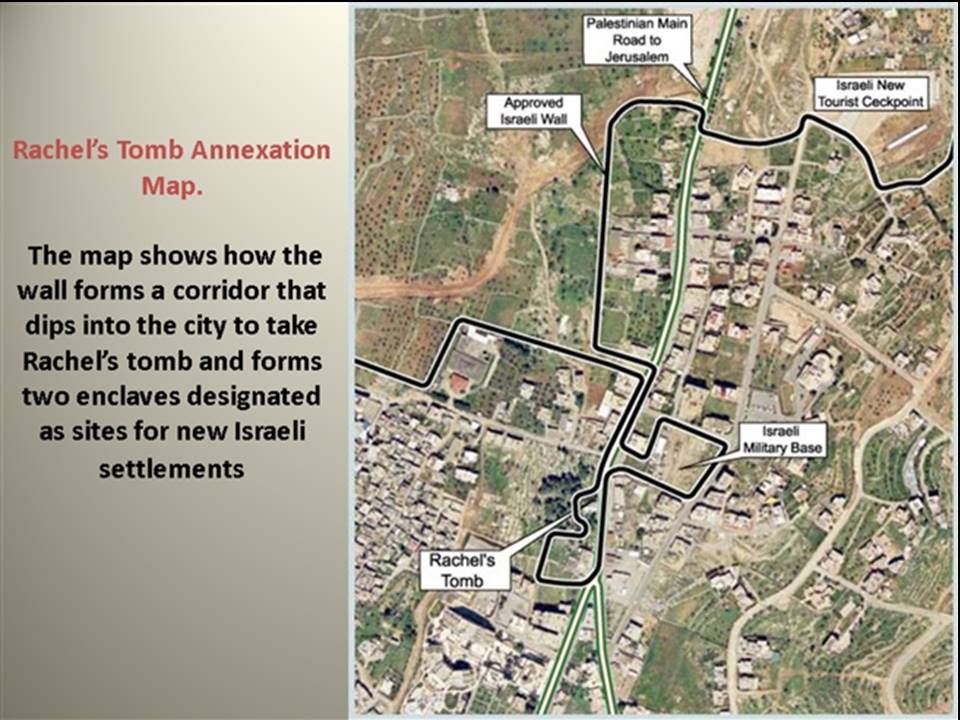
The wall in Bethlehem just outside of my hotel. In populated areas it is most definitely not a “fence”…
Resources for Further Study on Israel, Palestine, Ethics & Eschatology
Part of being a peacemaker involves listening to and learning from those voices from “the other side” with whom we strongly disagree and allowing our perceptions and biases to be challenged. Hopefully tonight’s event helped to do just that. the quotes, figures and visuals from JM’s presentation can be found at https://jmsmith.org/blog/Israel-Palestine-Notes. Also, the following resources represent a wide range of viewpoints—Palestinian, Israeli, Christian, Messianic, Western, Secular, Arab, Jewish—yet all provide a contrasting our counter-perspective to many of the narratives put forth by advocates of nationalistic or Dispensatioal forms of Zionism. This list is not a blanket endorsement of all resources the follow, but rather a starting point for those seeking to better understand the rationale behind various non-Zionist points of view—many of which are Israeli/Jewish voices.
Books
You WANT to be ‘Left Behind’!! – by JM Smith
Whose Land? Whose Promise?: What Christians Are Not Being Told About Israel and the Palestinians – by Gary Burge
The Other Israel: Voices of Refusal and Dissent – Roane Carey and Jonathan Shainin
Whose Promised Land? – by Colin Chapman
Reading Revelation Responsibly – by Michael Gorman
Expulsion of the Palestinians: The Concept of “Transfer” in Zionist Political Thought 1882-1948 – by Nur Masalha
Letters From Apartheid Street – by Michael McRay
The Israel Lobby and U.S. Foreign Policy – by John J. Mearsheimer and Stephen M. Walt
A Land of Two Peoples: Martin Buber on Jews and Arabs – Ed. By Paul Mendes-Flohr
Righteous Victims: A History of the Zionist-Arab Conflict, 1881-1998 – by Benny Morris
The Land Cries Out: Theology of the Land in the Israeli-Palestinian Context – Salim Munayer and Lisa Loden
Israel Palestine: A Christian Response to the Conflict – Craig Michael Nielsen
The General’s Son – by Miko Peled
A Threat from Within: A Century of Jewish Opposition to Zionism – by Yakov Rabkin
Zion’s Christian Soldiers?: The Bible, Israel and the Church – Stephen Sizer
Palestinians in Israel: Segregation, Discrimination and Democracy – by Ben White
Paul’s Letter to the Romans: A Socio-Rhetorical Commentary – Ben Witherington
The Problem With Evangelical Theology – Ben Witherington
Paul and the Faithfulness of God – by N.T. Wright
Surprised By Hope – N.T. Wright
The Mission of God – by Christopher Wright
Films/Videos
Little Town of Bethlehem – Jim Hanon (http://www.imdb.com/title/tt1602609/)
We See No Enemy – Zachary Crow (http://www.weseenoenemy.com/)
With God On Our Side – Porter Speakman Jr. (www.withgodonourside.com)
Our Neighborhood – Julia Bacha & Rebekah Wingert-Jabi (www.justvision.org/myneighbourhood/watch)
Burning Conscience: Israeli Soldiers Speak Out – AlernateFocus (https://www.youtube.com/watch?v=37MFa7ZKQWo)
Christ At the Checkpoint Conference Speaker Video Archive – (http://vimeo.com/christatthecheckpoint/videos)
History/Overview of the conflict
Why the Arabs Rejected Zionism…and Why It Matters (Middle East Policy Council) – http://tinyurl.com/mdza4oy
Palestinian Christian/Messianic Jewish/Reconciliation Organizations
Bethlehem Bible College – www.bethbc.org
Christ at the Checkpoint – www.christatthecheckpoint.com
Christians Committed to Biblical Justice Challenging Christian Zionism – http://www.christianzionism.org
Evangelicals for Middle East Understanding – www.emeu.net
Holy Land Trust – www.holylandtrust.org
Kairos Palestine – http://tinyurl.com/bvbzuae
Musalaha – www.musalaha.org
Mapping Messianic Jewish Theology – http://blog.mappingmessianicjewishtheology.eu/tagged/article
Tikkun International – http://www.tikkunministries.org/
Current Ethics and Peacemaking
How to be ‘Pro-Jesus’ in the Israeli-Palestinian Conflict (Christianity Today) – http://tinyurl.com/kt7eak8
The Israeli-Palestinian Conflict: Six Things I Believe (Lynn Hybels) – http://tinyurl.com/jwz5g2x
Holocaust Survivors Hand Gift Baskets to Asylum Seekers – http://tinyurl.com/olxb2ao
“Facts on the Ground”: The Occupation, Checkpoints, Separation Wall and Settler Violence
Map of the West Bank, Settlements and Separation Barrier (2012) – http://www.btselem.org/map/131764
U.N. Fact Sheet on Humanitarian Concerns in East Jerusalem – http://tinyurl.com/lx9bqk5
U.N. Fact Sheet on Humanitarian Impact of Israeli Settlement Policies – http://tinyurl.com/k9jo9vc
Breaking the Silence: Soldiers’ Testimonies from the Occupied Territories – www.breakingthesilence.org.il
B’Tselem: Monitoring Human Rights Abuses in the Occupied Territories – www.btselem.org
If Americans Knew – http://www.ifamericansknew.org/
Israeli Committee Against House Demolitions – www.icahd.org
Visualizing Palestine – http://visualizingpalestine.org/
Holocaust Survivors Criticize Israeli Policy Towards Palestinians – http://tinyurl.com/cj6r4af
Israeli Settlements: An Obstacle to a Two-State Peace (Foundation for Middle East Peace) – http://tinyurl.com/nxupgty
Photo diary of Palestinian workers’ daily checkpoint commute – http://tinyurl.com/o893fh4
A Whole System of Deception – https://www.middleeastmonitor.com/articles/middle-east/10647-a-whole-system-of-deception
Where International Law Stands on the Wall – http://visualizingpalestine.org/infographic/ICJ-Separation-Wall-Legality
West Bank Water Supply – http://visualizingpalestine.org/infographic/wb-water
20 Years of Talks – http://visualizingpalestine.org/infographic/Palestinian-Israeli-Peace-Talks-Settlements-Oslo
An Ongoing Displacement – http://visualizingpalestine.org/Disappearing-Palestine
Checkpoint Births – http://visualizingpalestine.org/infographic/checkpoint-births
Palestinian and Israeli Deaths Since 2000 – http://visualizingpalestine.org/timeline-of-violence
Segregated Roads in the Occupied Territories – http://visualizingpalestine.org/infographic/segregated-roads-west-bank
Israeli Settlement Bus Routes Across the Wall – http://visualizingpalestine.org/infographic/across-the-wall
Children of the Occupation: Growing Up in Palestine – http://tinyurl.com/k4wwvba
Setter Violence: It Comes With the Territory – http://972mag.com/settler-violence-it-comes-with-the-territory/85996/
Just Another Day of Violence – http://blog.yesh-din.org/en/
Former Israeli Attorney General: ‘We Should Have Evicted Hebron Settlers’ – http://tinyurl.com/karc49a
Swedish Human Rights worker attacked by Hebron Settlers – http://palsolidarity.org/2006/11/hebron-day-06/
Photos: 20 Years Since the Cave of the Patriarchs Massacre – http://tinyurl.com/ktatlno
Israeli Settler: ‘If I see her coming, no matter what age she is, 3, 4, 7, I’ll #@%& her over.’ – http://tinyurl.com/8d4yyc2
Settlers destroy 7,500 Palestinian Olive Trees – http://tinyurl.com/n8v3dpl
The “Apartheid” label and anti-Semitism
What does ‘Israeli Apartheid’ mean, anyway? (Haaretz) – http://tinyurl.com/n4gc6t2
A Night of Apartheid – http://www.timesofisrael.com/a-night-of-apartheid/
Zionism and Antisemitism: Racist Political Twins (J-Big – Jews for Boycotting Israeli Goods) – http://tinyurl.com/kwyxnwg
Why Israel is ‘Singled Out’ – http://mondoweiss.net/2012/08/why-israel-is-singled-out.html
A Conflict of Faith: Devoted to Jewish Observance, but at Odds With Israel – http://tinyurl.com/kn67umg
It’s the Occupation and Israeli Bigotry that are anti-Semitic (Larry Derfner) – http://tinyurl.com/kbjcppc
Why I Oppose Recognizing Israel as a Jewish State (Noam Sheizaf) – http://tinyurl.com/mbeno2s
Palestinian Textbooks Don’t Vilify Jews – http://tinyurl.com/byrjpcc
Disciple Dojo Resources on Eschatology:
DVD/CD Studies
“Apocalypse Now? What the Bible Teaches about the End Times” (CD or MP3) – https://jmsmith.org/store/apocalypse-now/
“Revelation: A Guided Tour of the Apocalypse” (3 DVDs) – https://jmsmith.org/store/revelation/
“The Bible for the Rest of Us” (3 DVDs) – https://jmsmith.org/store/bible
Audio Messages (https://jmsmith.org/store/audio/)
“The Woman, the Dragon & the Cross”
“Who are the 144,000?”
“Bible 101 – New Creation”
Teaching Videos (https://jmsmith.org/store/videos/)
“Why you definitely WANT to be ‘left behind’!”
“Israel, End Times, Politics & War”
“Symbols in Revelation: The Sea/Abyss”
“The Origins of the Rapture”
Q&A Videos (https://jmsmith.org/store/tough-questions/)
“Do Christians Keep the Ten Commandments?” (a discussion of Israel & Old/New Covenant)
“What happens if Israel is destroyed?”
“What’s up with the numbers 7 and 144,000 in the Bible?”
Illustrations, Essays & Blog Posts
“Millennial Views Chart” – https://jmsmith.org/downloads/millennial-views-chart.pdf
“Resources on the origin of Rapture views” – https://jmsmith.org/blog/raptureplethora/
“Critiquing Beth Moore…” – https://jmsmith.org/blog/critiquing-beth-moore-this-could-be-dangerous/
Articles on other issues related to eschatology, Israel & Palestine
Available in the Dojo Article Archive – https://jmsmith.org/store/articles/
To schedule a Disciple Dojo seminar, course or speaking engagement at your church, organization, or campus ministry please contact: jm@jmsmith.org
Once again, I want to express my sincerest thanks to Dr. Brown for participating in this discussion and reiterate that while our differences on a number of the issues are pronounced and serious, I have nothing but love and respect for him as a dear brother in the Messiah and I’ve grown so much from being challenged in my thinking by him during our years of debating this issue back and forth.
I also am so glad to be a part of the community of Gordon-Conwell, which puts a high value on biblical literacy and cultural engagement, all within a theologically diverse cross-section of evangelicalism.
JM
Categories: Biblical Scholarship, Biblical Theology, Blog, Book of Revelation, Church History, Eschatology, Global, Hebrew Bible, Ministry, New Testament, Political/Social issues, Romans, Theological issues
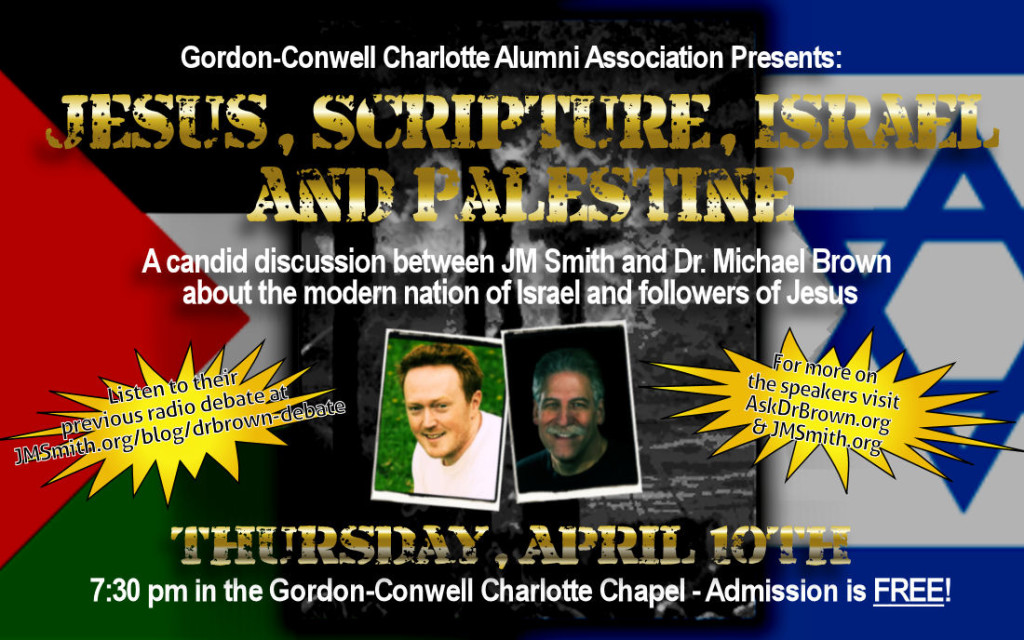


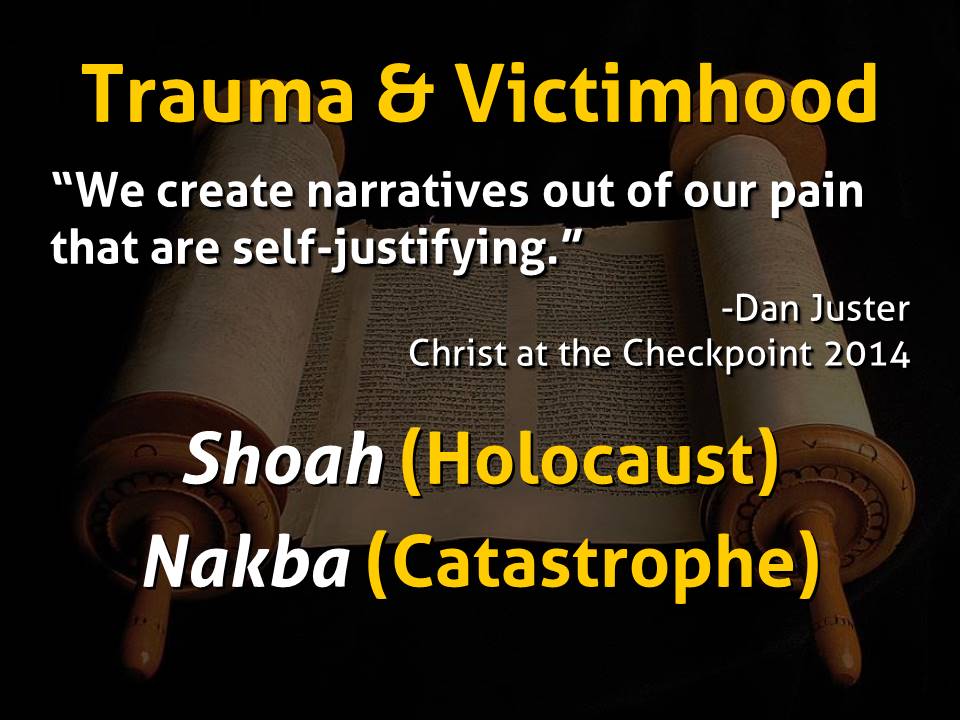
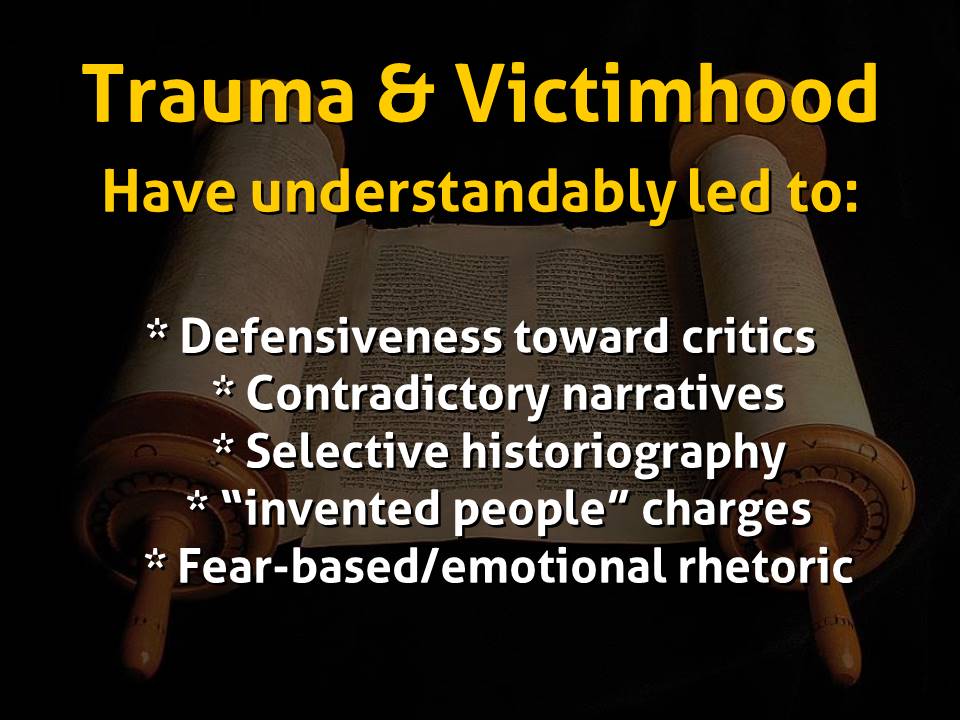

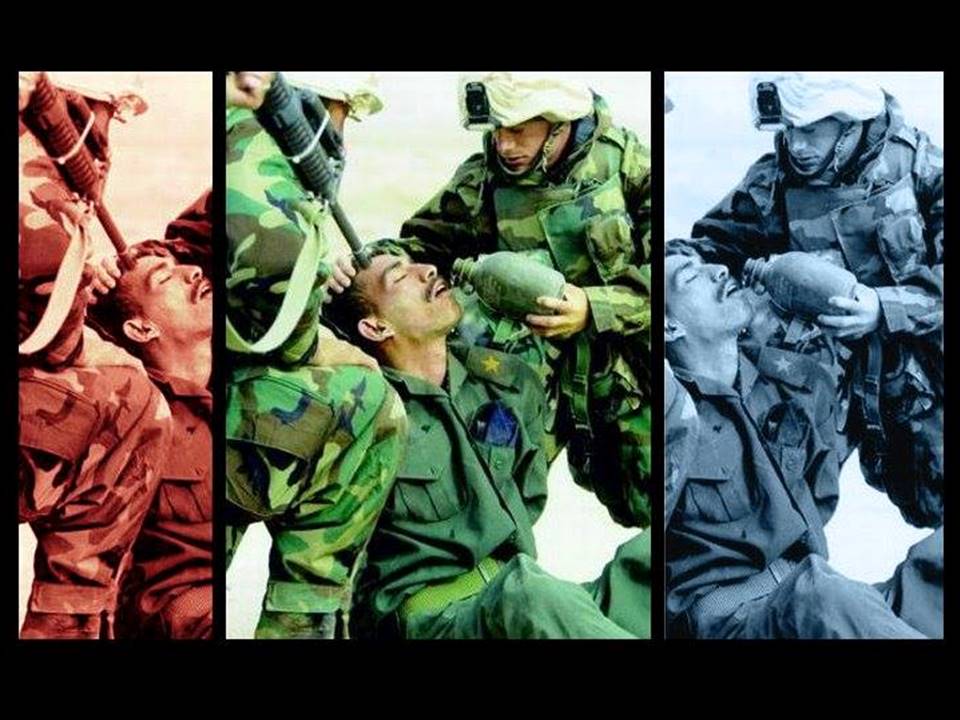
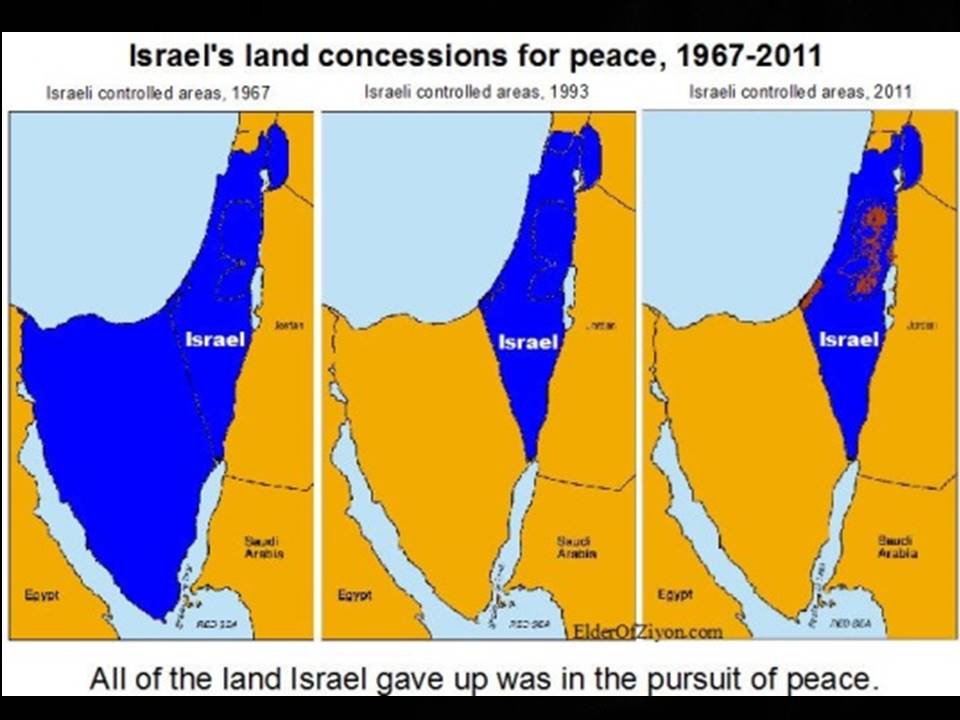
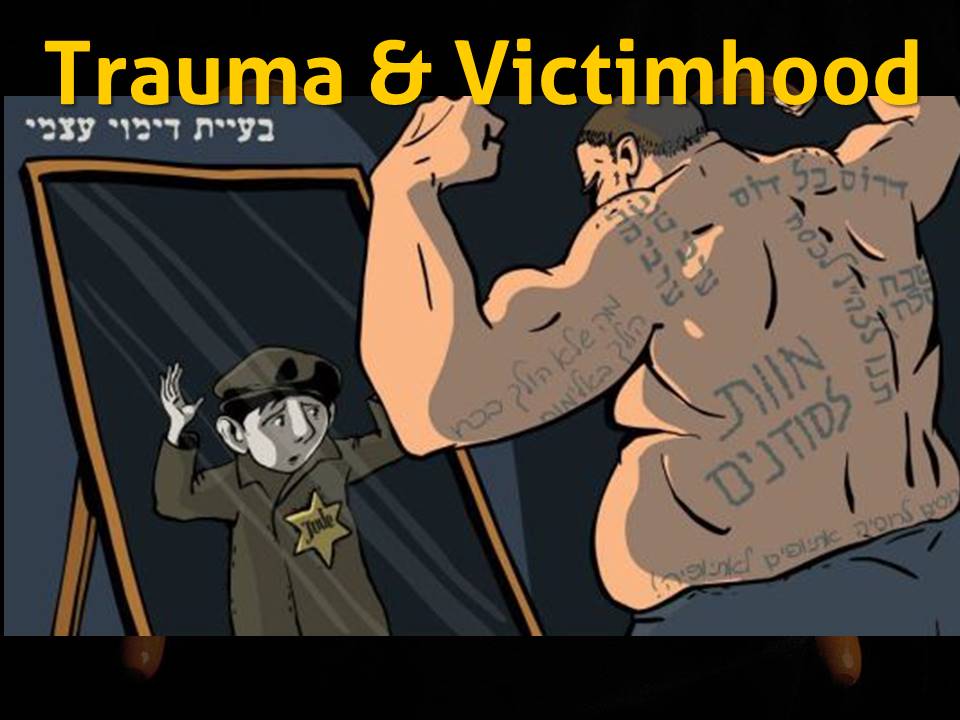
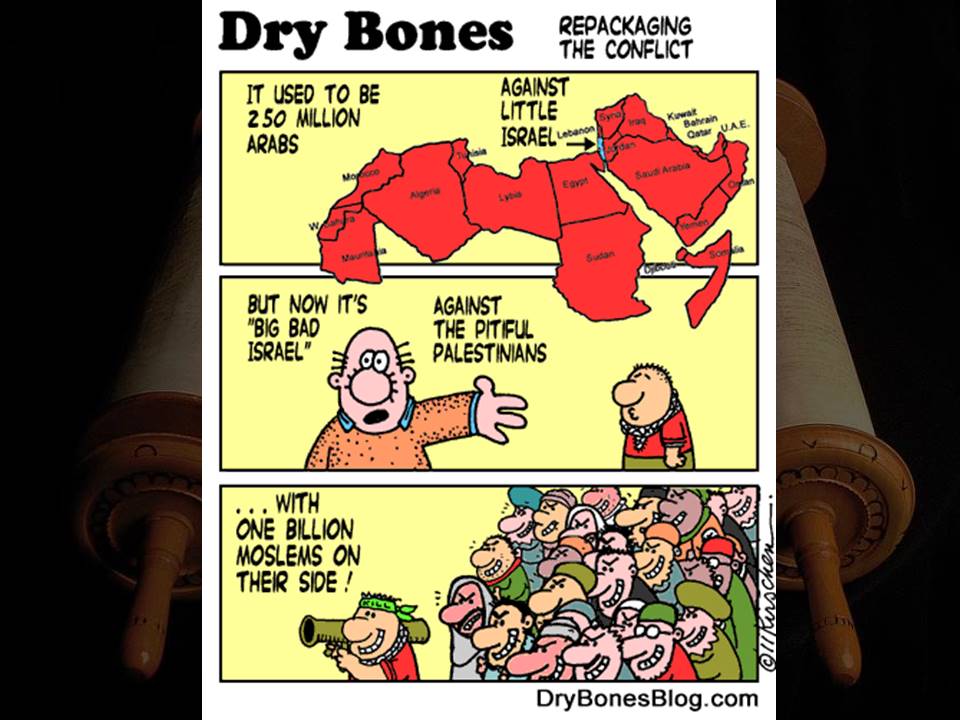
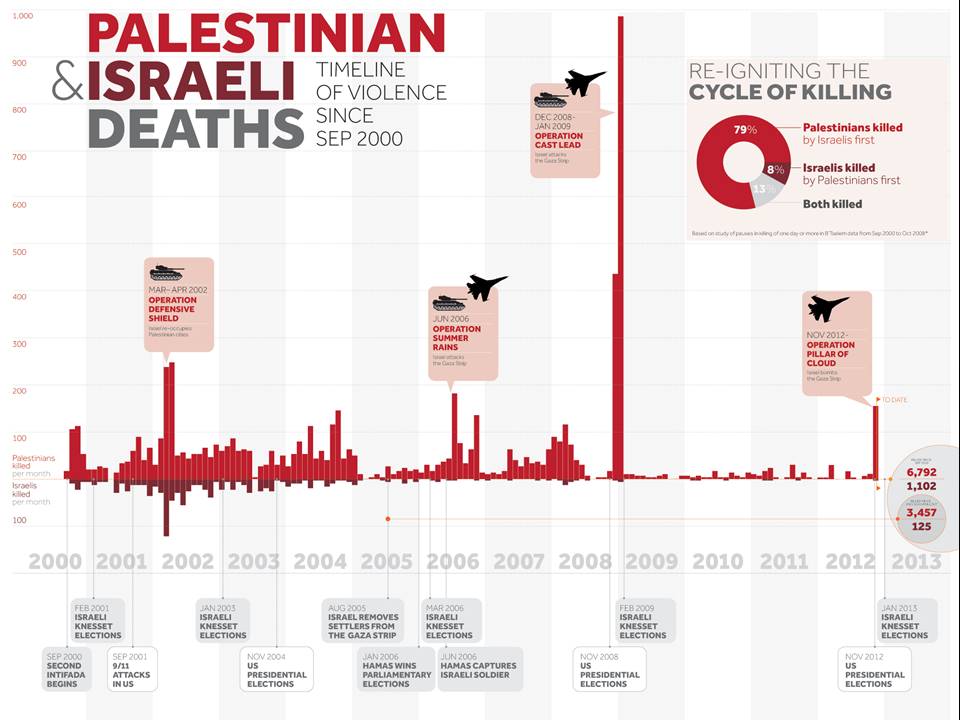
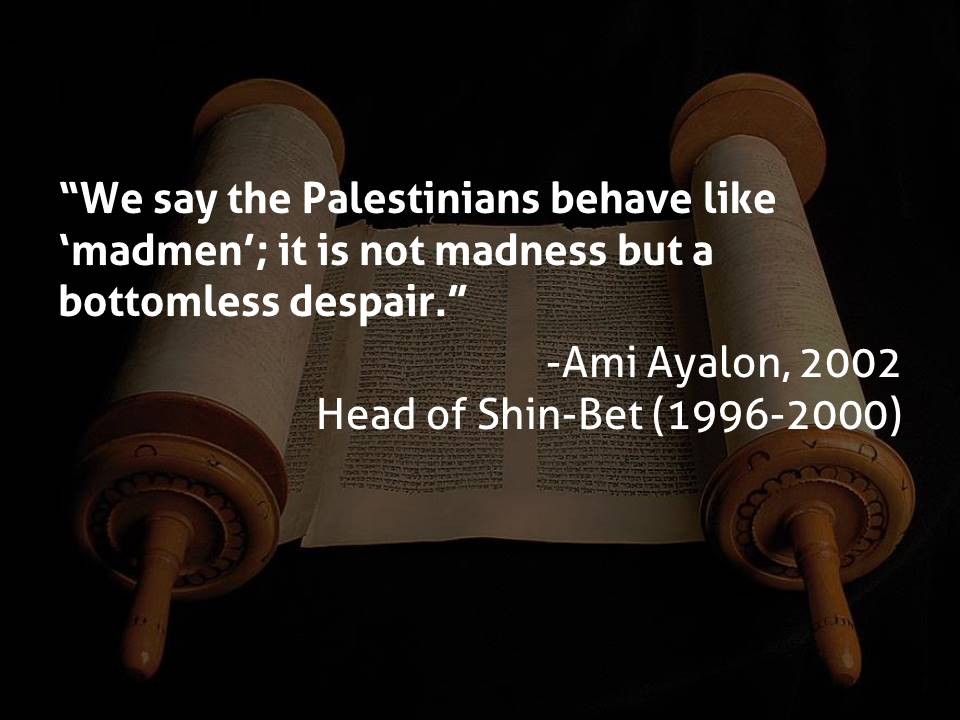
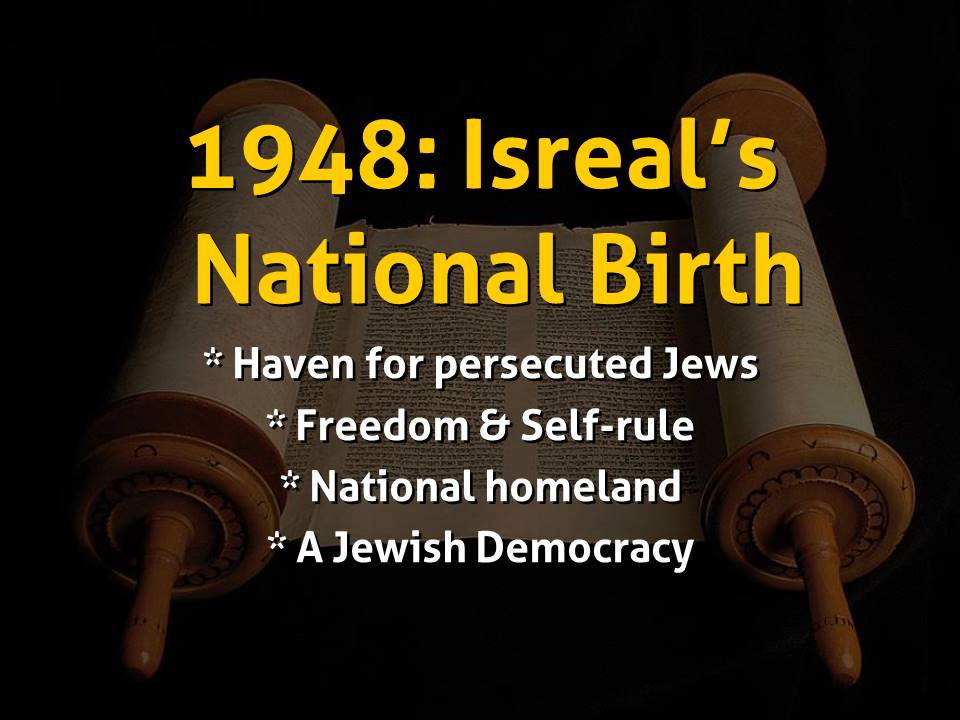
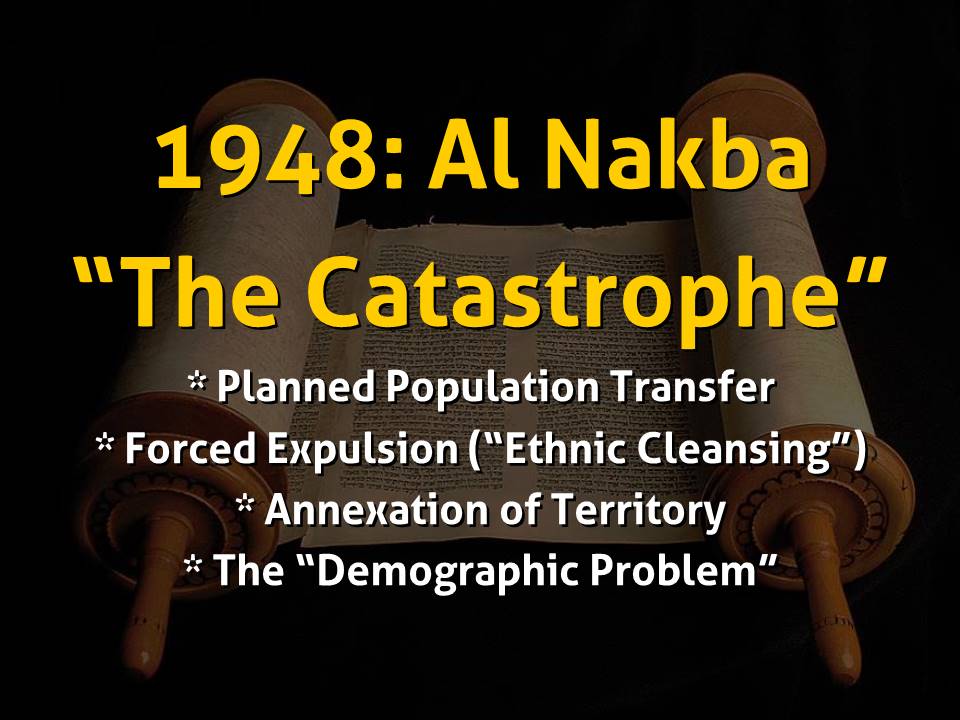
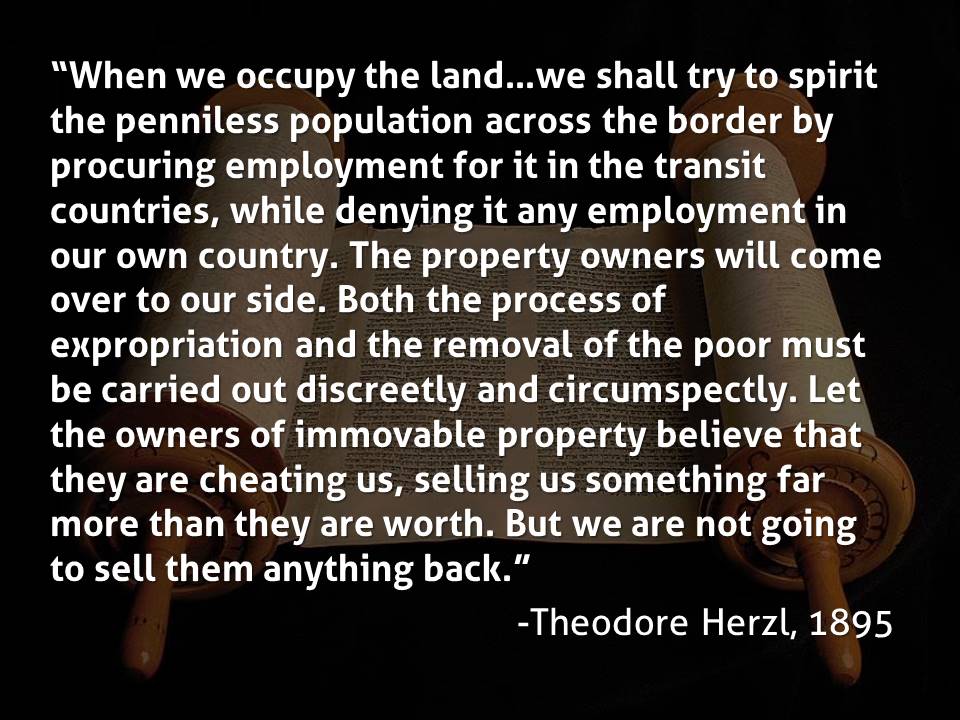
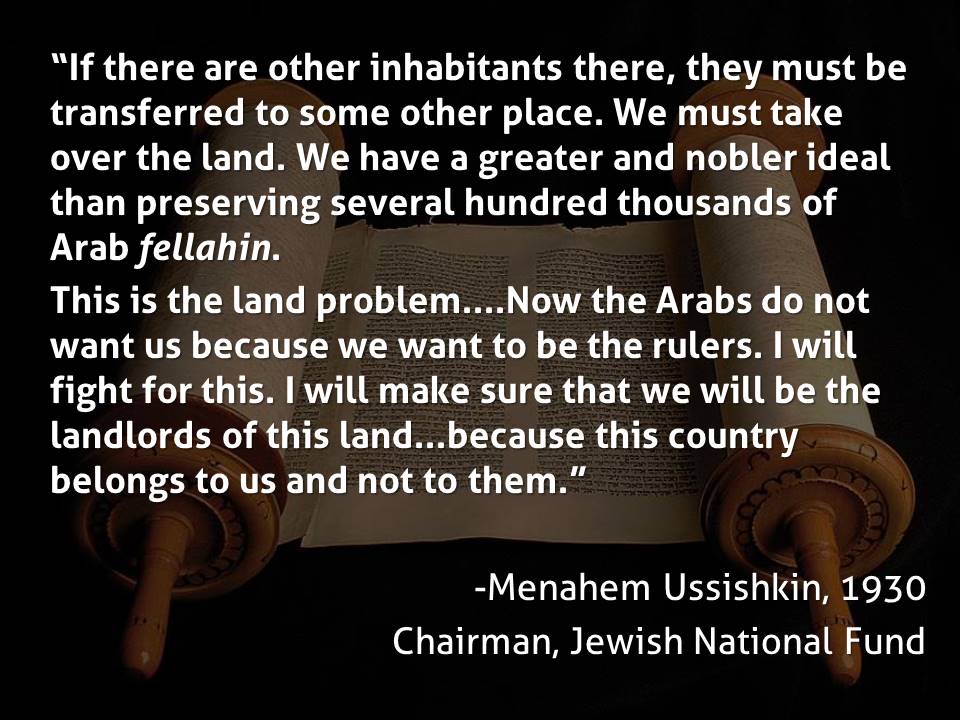
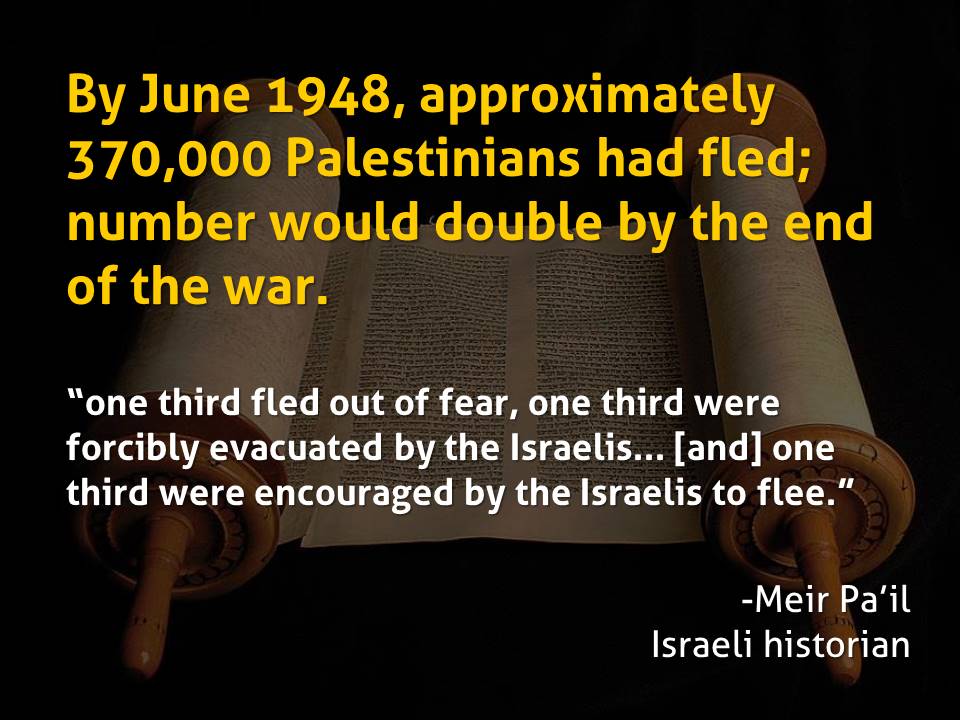
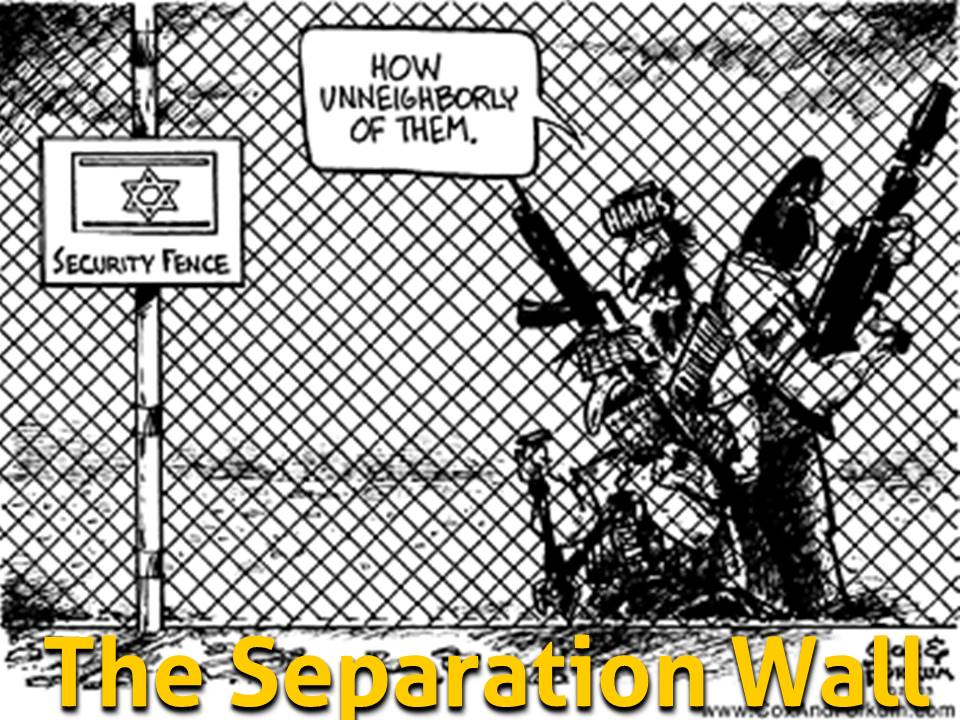
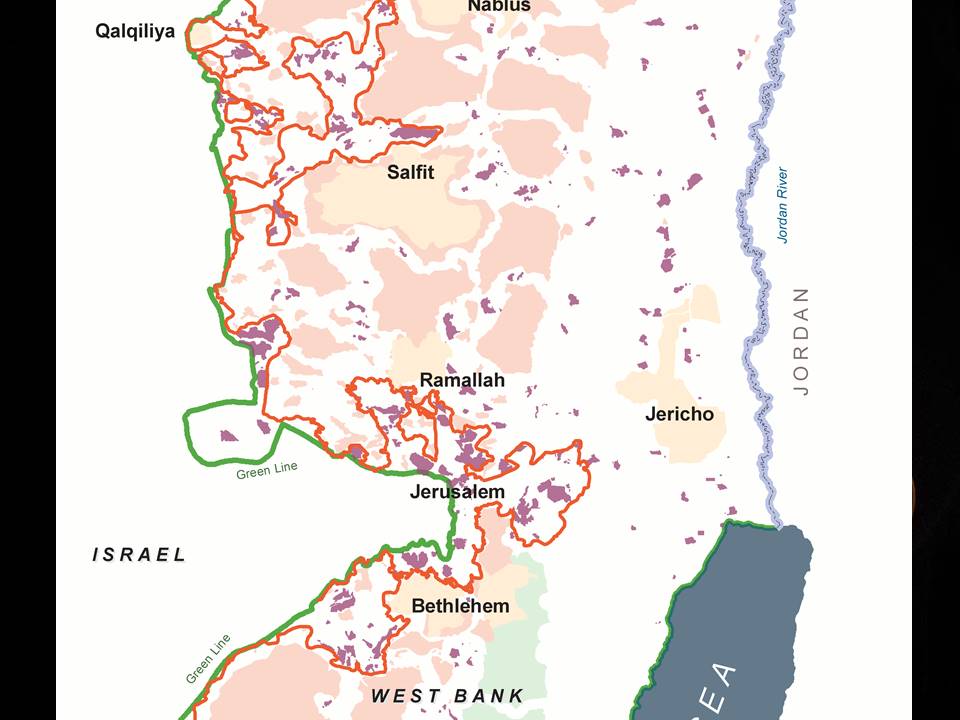
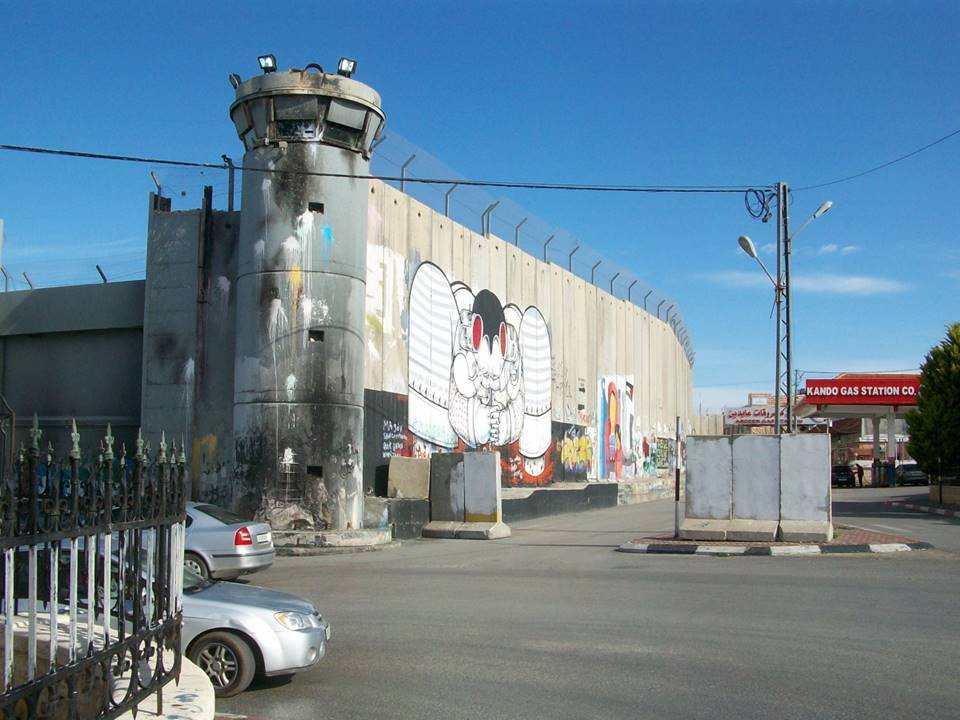
This was an excellent article, with tons of useful resources, and I’m going to keep this article as a resource for future research. Well done. I’m glad that you’ve shown both sides of the story so effectively.
by Leo Staley on May 8, 2014 at 1:07 am
Glad you found it helpful. Feel free to share with others who might benefit.
by jm on May 18, 2014 at 8:14 pm